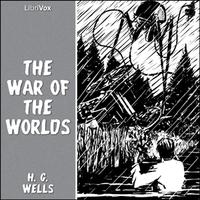The War of the Worlds: Chapter 25 (2)
These germs of disease have taken toll of humanity since the beginning of things—taken toll of our prehuman ancestors since life began here. But by virtue of this natural selection of our kind we have developed resisting power; to no germs do we succumb without a struggle, and to many—those that cause putrefaction in dead matter, for instance—our living frames are altogether immune. But there are no bacteria in Mars, and directly these invaders arrived, directly they drank and fed, our microscopic allies began to work their overthrow. Already when I watched them they were irrevocably doomed, dying and rotting even as they went to and fro. It was inevitable. By the toll of a billion deaths man has bought his birthright of the earth, and it is his against all comers; it would still be his were the Martians ten times as mighty as they are. For neither do men live nor die in vain.
Here and there they were scattered, nearly fifty altogether, in that great gulf they had made, overtaken by a death that must have seemed to them as incomprehensible as any death could be. To me also at that time this death was incomprehensible. All I knew was that these things that had been alive and so terrible to men were dead. For a moment I believed that the destruction of Sennacherib had been repeated, that God had repented, that the Angel of Death had slain them in the night.
I stood staring into the pit, and my heart lightened gloriously, even as the rising sun struck the world to fire about me with his rays. The pit was still in darkness; the mighty engines, so great and wonderful in their power and complexity, so unearthly in their tortuous forms, rose weird and vague and strange out of the shadows towards the light. A multitude of dogs, I could hear, fought over the bodies that lay darkly in the depth of the pit, far below me. Across the pit on its farther lip, flat and vast and strange, lay the great flying-machine with which they had been experimenting upon our denser atmosphere when decay and death arrested them. Death had come not a day too soon. At the sound of a cawing overhead I looked up at the huge fighting-machine that would fight no more for ever, at the tattered red shreds of flesh that dripped down upon the overturned seats on the summit of Primrose Hill.
I turned and looked down the slope of the hill to where, enhaloed now in birds, stood those other two Martians that I had seen overnight, just as death had overtaken them. The one had died, even as it had been crying to its companions; perhaps it was the last to die, and its voice had gone on perpetually until the force of its machinery was exhausted. They glittered now, harmless tripod towers of shining metal, in the brightness of the rising sun.
All about the pit, and saved as by a miracle from everlasting destruction, stretched the great Mother of Cities. Those who have only seen London veiled in her sombre robes of smoke can scarcely imagine the naked clearness and beauty of the silent wilderness of houses.
Eastward, over the blackened ruins of the Albert Terrace and the splintered spire of the church, the sun blazed dazzling in a clear sky, and here and there some facet in the great wilderness of roofs caught the light and glared with a white intensity.
Northward were Kilburn and Hampsted, blue and crowded with houses; westward the great city was dimmed; and southward, beyond the Martians, the green waves of Regent's Park, the Langham Hotel, the dome of the Albert Hall, the Imperial Institute, and the giant mansions of the Brompton Road came out clear and little in the sunrise, the jagged ruins of Westminster rising hazily beyond. Far away and blue were the Surrey hills, and the towers of the Crystal Palace glittered like two silver rods. The dome of St. Paul's was dark against the sunrise, and injured, I saw for the first time, by a huge gaping cavity on its western side.
And as I looked at this wide expanse of houses and factories and churches, silent and abandoned; as I thought of the multitudinous hopes and efforts, the innumerable hosts of lives that had gone to build this human reef, and of the swift and ruthless destruction that had hung over it all; when I realised that the shadow had been rolled back, and that men might still live in the streets, and this dear vast dead city of mine be once more alive and powerful, I felt a wave of emotion that was near akin to tears.
The torment was over. Even that day the healing would begin. The survivors of the people scattered over the country—leaderless, lawless, foodless, like sheep without a shepherd—the thousands who had fled by sea, would begin to return; the pulse of life, growing stronger and stronger, would beat again in the empty streets and pour across the vacant squares. Whatever destruction was done, the hand of the destroyer was stayed. All the gaunt wrecks, the blackened skeletons of houses that stared so dismally at the sunlit grass of the hill, would presently be echoing with the hammers of the restorers and ringing with the tapping of their trowels. At the thought I extended my hands towards the sky and began thanking God. In a year, thought I—in a year…
With overwhelming force came the thought of myself, of my wife, and the old life of hope and tender helpfulness that had ceased for ever.

